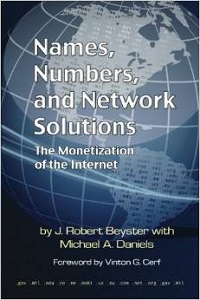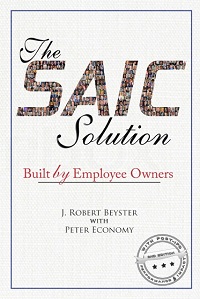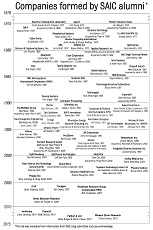What Do You Want in a Book About the Internet?
15 Comments Published by Dr. Beyster March 17th, 2009 in Network Solutions.Last Monday Peter, Mary Ann and I had a phone conference with our literary agent to discuss his progress in obtaining a publisher for the new book. It turns out the publishing industry is in a downturn right now, and they are generally uninterested in a new book unless it is very novel and sensational in some way. For example, they might be interested if the book essentially exposes some unknown irregularities in what’s going on in the Internet and pushes the danger button. This would give publishers the opportunity to expose them. This is not the kind of book we want to write. We were also told that a history book with projections about the future won’t sell.
At this point I think it would be helpful to hear from each one of you. What topics would you personally be interested in reading about that Mike Daniels and I will be writing about the Internet? What idea would cause you to buy this book? Please post your suggestions, and Mike and I will consider them. I look forward to seeing what you think.
– Bob





Dr Beyester:
May I humbly suggest that you try publishing on the Web? It sounds like your target audience is probably comfortable using the web as one of their primary source of information. You could charge a subscription fee and publish the book in chapters, or you could take a credit card purchase to read it online. I discourage allowing the download of a pdf until you book has been out for sometime. After that allowing consumers to download the pdf version for a fee can be effective marketing for the next book.
I own a small publishing (read dinky publishing company) and have found that working with the retailers and multitier book distribution network extremely difficult and very unsatisfying.
Warm regards,
Bill
I would think that a reasoned look at privacy and security issues could easily involve discussion of “unknown irregularities”. Identity theft, masking, and use of false identity could potentially become interesting discussions if they were developed by covering anecdotal incidents and a description of how these “irregularities” can be manufactured.
Creation of magnet sites targeted at various vulnerable populations, aggregation and exploitation of data bases, assessment of personal habits and preferences, etc. are little understood by the general population and might be considered interesting reading.
Allen
Dr. Beyster:
Hmmm. I think that movie critics and book publishers both serve useful purposes, but perhaps they both don’t get it right a lot of the time in terms of what is successful or not.
I’m not sure that your potential audience is looking for a seedy “tell all” tale here. I think they (the publishers) may be missing an important point.
Rather I think that a thoughtful history and recounting of the decisions (and perhaps there were some “mis-decisions” to relate also) and fate that happened related to the development of the public and commercial use of the DARPA inspired Internet by some of the pivotal individuals involved would make a timeless story. I don’t believe that such a book currently exists.
The rise in the global use of the Internet for the common good over the past dozen years is a fundamental historic event in human communication and knowledge and would make good reading.
I do believe that publishing electronically is worth considering. If you really think about it, the concept of physically publishing paper copies of a book in anticipation of selling them is really a rather archaic and resource-wasteful concept, although I must admit that I still prefer to “curl up with a good book”.
Bill
Stay with the basics – where the internet came from, who was involved (Backgrounds) and what tangents have users taken the nebula.
While having a NY Times or Oprah book may be interesting (and profitable) – the critical thinking book (and the one that will continue to sell over time) would be the source for how the internet changed the world – the perspective is similar to how oil has dominated the world over the past 100 years. While oil will be depleted – information and digital creativity will continue to grow and provide for future innovations.
Within every major world development there have been key people involved. Those characters are the “Parents” of the industry – yet the children of the industry take on their own personalities and lead their own lives.
Instead of a top ten book – how about a scholarly look at the foundations of the internet – and then work with Discovery or other to produce the documentary – this video presentation may take the “marketing” route and show the seedy side of the internet (Children gone bad, ie pornography and scams) and the helpful side (information logistics & data security), and the entertaining children (gamers and arts) – the documentary will be good exposure for the book.
To be entrepreneurial means to think outside the norm – and if today’s norm is creating scratch and sniff for the majority public – then maybe targeting the 15% of Americans with an advanced education may be the direction to take.
I for one would prefer to have a book that I would include and keep in my library – rather than one that I would read and quickly sell off on ebay.
Blake Escudier
Bill (Proffer): Most people I think would agree with you that reading the printed word in a relaxed environment is still preferred. It’s a good way to commit the essence of a book to memory. You are of course right that the future is electronic books, via Amazon.com and the like. The market seems to be growing, in particular Amazon’s Kindle reader. It’s not clear how many people have actually bought Kindles, however, as Amazon refuses to disclose sales figures. I still would like to find a traditional publisher for the new book. Publishers are looking for a unique and catchy point of view on the topic. It must capture people’s attention. — Bob
Allen: I agree with you that security is an important issue for the new book to address. Currently we have one chapter devoted to that topic. Perhaps the entire book should focus on security. We will be discussing this idea soon. — Bob
Bill (Weeks): I’m interested in learning more about your own publishing company. Do you publish traditional books or e-books via the Internet or both? Please provide more details. — Bob
Dr. Beyster: Hello.
I have always enjoyed books that expose the effects of technology on history and society. I would find a book about the early rise of the technical talents and the tipping points for technology that caused some to fail and others to prosper to be an interesting topic. I would be interested in both the history of the companies involved but also of the early technical milestones that marked progress to what we have today.
not sure how much broad appeal such a work would have though.
good luck.
Brian Dealy
Dr. Beyster:
We published a traditional print book that I must say has been a dismal success. No doubt, we made plenty of mistakes, but the quality of our book is excellent. I found the process of trying to work with traditional retail outlets like B&N and Borders to be very frustrating. They and their layers of distribution partners want to take a cut out of the proceeds to the point where you are practically paying them to distribute and sell your book. If young people (young professionals) are your audience, I believe there is a compelling argument for skipping the middle man and going straight to your market. I’m an OG (Old Guy) and I use the Web for almost all my nonfiction reading. I read nonfiction mostly to acquire new knowledge which I can deploy in one form or another. The web offers me the opportunity to easily integrate research from resources beyond the primary source.
Fiction I only get in two ways: books and CDs. I drive quite a bit, so CDs come in handy.
Warm regards,
Bill Weeks
Prior to the public using the internet we used telenet and tymenet for Email and access to Data Bases. As we learned what users did online and more important what they would not do, the migration of technology came to the front. Client lists and brand new services grew so that it became the worlds largest online meeitng place at the time called DIALCOM, members of congress, early learners who moved to AOL as managemnt, major US companies, and then the standards travel and legal research access with email alerts…
What was leared then was that any new technology can find its unique use given exposure and most of the time it was not what the large companies would bet on. The NYT was a customer and put up “hot type” only to find people would only read two pages of type with out signoff. (The baud rate of the human eye is so mcuh faster)
History is the teacher if you look at it right, and think Google, Yahoo, and others that were hatched out of innoviation not conventional thinking. The tools of the internet farmed new use for it, and that is the technical message that should be understood by readers, a reflection of the inquiring mind with new distributive tools to extend itself.
Bill: Enjoyed reading your comments on my blog. I’d like to get a copy of your book — would you mind sharing the name with us? I’m curious how many copies you sold and how much it has cost you to produce. You can email the information to me rather than posting on the blog if you’re willing to share it. — Bob
Brian: I appreciate your suggestion. We’ll keep your ideas in mind as we prepare the new book. — Bob
Blake: We’re currently considering a new direction with the book that uses our own experience with Network Solutions as a successful example of a public-private partnership. This book could be used by policymakers to help guide future such initiatives in a variety of areas. We expect such entities to increase in the future as the government finds itself limited due to competing demands. — Bob
Dr. Beyster,
Do you see something originating out of the SBIR program – or something different where the private company approaches Government with ideas.
Certainly with our present government so ready to shell out money to failing organizations – they would see wisdom in investing with organizations on the cutting edge of industry.
But who’s idea – and who makes the political decision on where to invest? Do you believe a Foundation of some kind that has industry leaders would be able to direct investment (partnership) without influence (political and individual economic benefit)?
And very important, which I’m sure you are very aware – how do you remove the government inefficiency of bureaucracy – especially in programs that have been in place for a while. (Many programs may start entrepreneurially – but after a few years government staff usually find ways to bogg non-government initiative).
There does need to be a new approach towards future technology innovation – or non-US countries will out-spend the US for development. The US has benefited from private enterprise and private enterprise has benefited from Government spending – it would seem approprate to have a working foundation to take advantage of both.
Cheers,
Blake Escudier
Dr.Beyster,
I agree with Bill Weeks when he says you can try publishing on the web. I recently wrote a fiction novel and I took that approach. I decided to publish it myself on my own website. It’s been working well for me.
Regards,
-Hayde
Blake: I’m most familiar with the DARPA SBIR program — DARPA is the Defense Department’s research arm. In this case DARPA has initiated research which has turned into many research areas that have had a great impact on our military. For example, stealth was originated at DARPA. The Army, Navy, and Air Force and the Department of Energy also have their own SBIR programs which are responsible for initiating much of the advanced technologies for the military and Department of Energy. So I’m a big believer in the SBIR program. — Bob
Hayde: Thank you for your blog submission. It’s not clear yet how we will publish our new book — we’re having ongoing discussions with our agent and plan to go another round with the publishers. — Bob